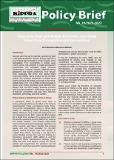| dc.date.accessioned | 2023-01-12T06:49:33Z | |
| dc.date.available | 2023-01-12T06:49:33Z | |
| dc.date.issued | 2022 | |
| dc.identifier.uri | https://repository.kippra.or.ke/handle/123456789/4026 | |
| dc.description.abstract | Kenya is yet to fully tap its potential in positioning itself
in the global production network. Primary agriculture
and minerals still dominate its share of global trade
participation. Firm involvement in grobal value
chains (GVCs) has potential to create employment
opportunities and ultimately propel structural
transformation. However, despite a relatively strong
geographic and logistic positioning, most Kenyan
firms, especially the Small and Medium-sized
Enterprises (SMEs) mainly produce for the domestic
market. The country’s involvement in Global Value
Chains (GVCs) is still limited, and mostly on low valueadded
phase. Only 15% of SMEs in Kenya engage in
global value chains. Significant gaps between GVC
players and non-GVC players emanate primarily
from financial constraints.1 SMEs have a higher level
of financial vulnerability, lack lead firm’s technical
assistance, technology and skills transfer. | en |
| dc.language.iso | en | en |
| dc.publisher | The Kenya Institute for Public Policy Research and Analysis (KIPPRA) | en |
| dc.relation.ispartofseries | PB/19/2022-2023 | |
| dc.subject | Global Value Chain | en |
| dc.subject | Small and Medium Enterprises | en |
| dc.subject | Financial Interventions | en |
| dc.subject | Financial Innovation | en |
| dc.subject | Production Network | en |
| dc.title | Policy Brief No. 19 of 2022-2023 on Integrating Small and Medium Enterprises into Global Value Chain through Financial Interventions | en |
| dc.type | KIPPRA Publications | en |
| ppr.contributor.author | Wafula, Kevin & Abdulahi, Mohamed | en |




